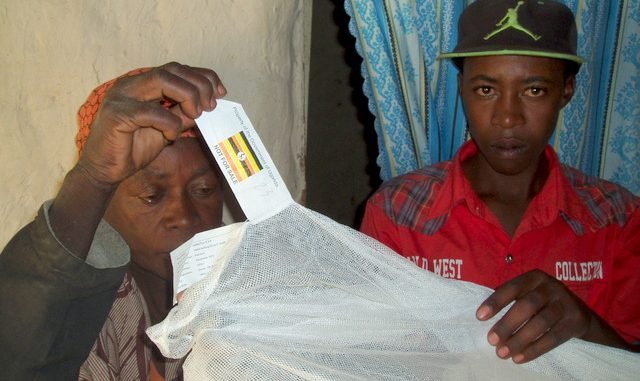
The insecticide treated mosquito nets procured by government for free distribution to citizens across the country in the fight against malaria have found their way to shops and streets in Kampala. The mosquito nets have a hard texture compared to the other brands and go for Shillings 25,000.
The Health Ministry has so far distributed 7,095,479 insecticide treated mosquito nets in 44 districts such as Adjumani, Agago, Alebtong, Amuru, Apac, Arua, Gulu, Kitgum, Koboko, Kole, Lamwo, Lira, Maracha, Moyo, Nebbi, Nwoya, Omoro, Otuke and Oyam.
The Health Ministry, Public Relations Officer, Vivian Serwanjja, says there is a standard procedure as far as the delivery of the mosquito nets is concerned. According to Serwanjja, the mosquito nets are ideally monitored from the moment they enter privately owned contracted ware houses fitted with state of the art security systems like cameras.
“From the store, the nets are escorted by security personnel from both the Uganda Police Force and Internal Security Organization to pre identified sub-county stores manned by trained store managers and security personnel before they are moved to designated distribution points for distribution on a particular day. From that point, the end user receives their net from their Local Council 1 leader and Village Health Teams (VHTs),” she said.
Despite this, this publication found some hawkers in Kampala selling the government mosquito nets. We spoke to two hawkers to establish why they vend the government mosquito nets and how they get them. Abbas Tuhabwe, a vendor in Ntinda told us he buys the mosquito nets from a shop in the city he declined to disclose at between Shillings 12,000- 15,000 each.
He explains that he was prompted to sell the nets because of the high demand for them since they are stronger and treated compared to other brands on the market. Edward Kakungulu, a hawker along Jinja road explained to this publication how the government mosquito nets end up on the streets.
“Getting these nets is easy. You just need to know where to go and who to approach. It starts with whom you know at the stores or along the transportation routes because that is where the nets are stolen from before they are stored in shops and sold to us,” he said.
Both Tuhabwe and Kakungulu say once they buy the nets, they repackage them before they sell them to the public. According to Tuhabwe, they remove the Ugandan Flag that is found in the middle of the nets, fold them neatly and repackage them in plain plastic bags that are not branded ready for sell.
The Director of Health Services Clinical and Community in the Health Ministry, Anthony Mbonye, says they have so far recorded two cases of theft of government mosquito nets in Kapchorwa and Serere districts.
According to Mbonye, the theft of the mosquito nets is detrimental to the malaria control program since it abuses the campaign and leads to the loss of nets in an already expensive venture.
Jimmy Opigo, the Programme Manager National Malaria Control Program, says one shipment of 574 bales of mosquito nets enroute to Serere in Eastern Uganda was diverted to central region. He says the transporters decided to go to Mityana instead of the designated district.
He says the track packed at a house in Mityana where the nets were stashed temporarily before they were moved to unknown locations.
In this campaign, the Health Ministry targets to distribute 25 million nets valued worth 331.5 billion shillings. The nets were procured with funding from the Global Fund, Department for International Development and President’s Malaria Initiative and Against Malaria Foundation.
– URN



